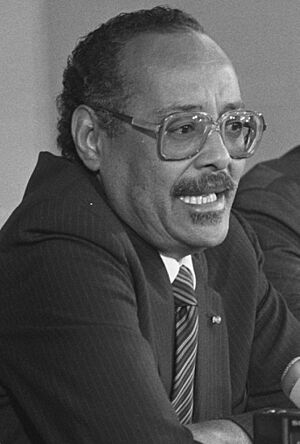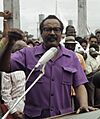Henck Arron facts for kids
Quick facts for kids
Henck Arron
|
|
|---|---|

Henck Arron in 1988
|
|
| 1st Vice President of Suriname | |
| In office 25 January 1988 – 24 December 1990 |
|
| President | Ramsewak Shankar |
| Preceded by | Office Established |
| Succeeded by | Jules Wijdenbosch |
| Prime Minister of Suriname | |
| In office 24 December 1973 – 25 February 1980 |
|
| Monarch | Queen Juliana (1973–1975) |
| President | Johan Ferrier (1975–1980) |
| Governor General | Johan Ferrier (1973–1975) |
| Preceded by | Jules Sedney |
| Succeeded by | Henk Chin A Sen |
| Personal details | |
| Born |
Henck Alphonsus Eugène Arron
25 April 1936 Paramaribo, Suriname |
| Died | 4 December 2000 (aged 64) Alphen aan den Rijn, Netherlands |
| Political party | National Party of Suriname |
| Spouse | Antoinette Leeuwin |
Henck Alphonsus Eugène Arron (born April 25, 1936 – died December 4, 2000) was a very important politician from Suriname. He became the first Prime Minister of Suriname after the country became independent in 1975. He was a member of the National Party of Suriname. Arron served as Prime Minister from 1973 until 1980. Later, he also served as the first Vice President of Suriname from 1988 to 1990.
Contents
Henck Arron's Early Life and Career
Henck Arron was born in Paramaribo, the capital city of Suriname, in 1936. After finishing high school in 1956, he moved to the Netherlands to study banking. He worked for several years at a bank called the Amsterdamsche Bank.
When he returned to Suriname, Arron worked at the Vervuurts Bank. This bank is now known as Hakrinbank. Later, in 1963, he became a deputy director at the Volkskredietbank, which means "People's Credit Union."
Becoming a Political Leader
In 1961, Henck Arron joined the National Party of Suriname (NPS). This was a major political party in the country. By 1970, Arron was chosen to be the Chairman of the NPS.
In 1973, he formed a group of political parties that worked together. This group included the Nationalist Republican Party (PNR), which wanted Suriname to become independent. This group won the general election in 1973.
Leading Suriname to Independence
On December 24, 1973, Henck Arron became the Prime Minister. His main goal was to lead Suriname to become an independent country. The NPS found a strong supporter in the Dutch Labour Party, who also wanted Suriname to be independent soon.
In February 1974, Arron announced that Suriname would become independent before the end of 1975. Many people were surprised by this news. This was because Arron's party did not have a clear majority of people who wanted independence right away.
The Netherlands officially granted Suriname independence on November 25, 1975. This was a big moment for the country. However, the early years of independence were challenging. There were some social problems and economic difficulties.
Challenges and Return to Politics
After independence, Arron won another term in the 1977 elections. During these first years, about one-third of the people in Suriname moved to the Netherlands.
In 1980, the military in Suriname took control of the government. This event is called a coup d'état. On February 25, Henck Arron was removed from his position and put in jail. The military was led by Dési Bouterse.
Arron was released in 1981 and placed under house arrest. A year later, he became the managing director of the Surinamese People's Credit Bank.
In 1987, several international groups, including the United Nations, helped Suriname return to democracy. That year, Arron was elected as the Vice President of Suriname. He served from January 26, 1988, to December 24, 1990. During this time, Ramsewak Shankar was the president. However, their government was again overthrown by the military in 1990.
Later Life and Legacy
In December 2000, Henck Arron was invited to the Netherlands. He was there to talk about 25 years of Suriname's independence. On the evening of December 4, he sadly passed away from a heart attack at his brother's home.
Honours
- Suriname: Grand Cordon (Grootlint), Honorary Order of the Yellow Star (2000)
Images for kids
 | Jewel Prestage |
 | Ella Baker |
 | Fannie Lou Hamer |



